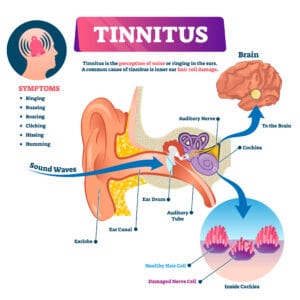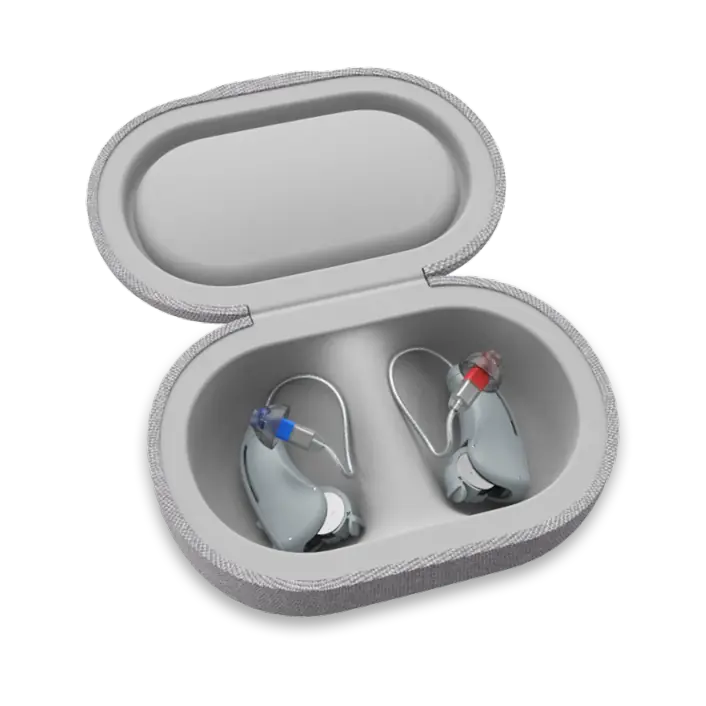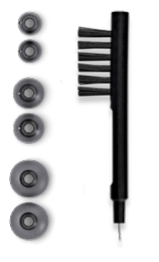Tinnitus Talk – All the Information You Need
Published: February 5, 2020
Updated: March 24, 2023
In a busy and noisy world, you may crave silence at times, enjoying the tranquility it offers. For those affected by tinnitus, silence may be continually elusive, because, to them, even silence is noisy. This article will talk about tinnitus: what it is and what the most common causes are.
There is a common misconception that nothing can be done for those suffering from tinnitus. While there is currently no single cure for this symptom, it can be managed, alleviated, and overcome.
Tinnitus Talk: what is tinnitus?
Tinnitus is not a disease, but rather a symptom of an underlying condition.
Tinnitus was defined by Professor Pawel J. Jastreboff (the creator of Tinnitus Retraining Therapy) as a phantom auditory perception perceived only by the person. In other words, tinnitus is the awareness of a sound that does not have an external source. It is a sound that does not originate from the environment but is generated by the hearing system.
This symptom could be perceived in one or both ears, or in the head. It can be described as ringing in the ears, but can also resemble whistling, buzzing, humming, hissing, crickets chirping, or any other sound. It can be persistent or occasional, and the volume can vary from barely noticeable to distracting.
Is it common?
Most people, even those with normal hearing, experience some degree of tinnitus at some stage. It is common to experience a brief episode after spending time in an environment with high noise levels e.g. a live concert or a nightclub. In these cases, it is usually temporary. It can also appear for no reason and then vanish just as suddenly.
As many as 1 in 6 people may have tinnitus that is persistent but mild, and as such does not bother them much. However, around 1 in 100 people suffer from persistent tinnitus that negatively affects their quality of life.

What are the causes?
Tinnitus can cause frustration and anxiety, but it is seldom serious. Often it is merely secondary to an injured hearing system and is often associated with hearing loss. Because prolonged exposure to loud sounds often causes tinnitus, most people with tinnitus also experience some degree of noise-induced hearing loss.
Test your hearing for free online on the Lexie Hearing website now!
Nonetheless, tinnitus can also affect those with normal hearing. Although it is generated in the hearing system, it can be a symptom of an underlying condition elsewhere. However, tinnitus is usually not associated with any serious physical condition.
The causes can be difficult to pinpoint as they are wide-ranging and numerous. According to the American Tinnitus Association, there are as many as approximately 200 different conditions for which tinnitus can be a symptom.
Possible causes include:
- Sensorineural hearing loss
- Congenital (present from birth)
- Acquired e.g.:
- Noise-induced hearing loss
- Age-related hearing loss (Presbycusis)
- Repeated exposure to loud noise, or even once-off exposure to extremely loud noise
- Middle ear issues e.g. middle ear fluid, ear infections, otosclerosis, or any other problem affecting the middle ear or eardrum
- Physical obstructions in the ear canal e.g. earwax
- Inner ear diseases e.g. Ménière’s Disease
- Injury to the ear from e.g. a direct blow to the ear or barotrauma
- Head or neck injury
- Traumatic Brain Injury (TBI)
- Psychiatric disorders e.g. depression or anxiety
- Excessive stress
- Blood flow (vascular) problems e.g. high blood pressure or atherosclerosis (hardening of the arteries)
- Metabolic disorders e.g. hyperlipidemia, anemia, or thyroid disorders
- Autoimmune disorders e.g. Lyme disease or fibromyalgia
- Inflammatory disorders e.g. arthritis
- Certain prescription medications, drugs, herbs, and chemicals particularly antibiotics or high doses of aspirin, as well as some over-the-counter medications
- Withdrawal from benzodiazepines
- Certain vitamin/mineral supplements
- Taking in too much vitamin D
- Deficiency of zinc or vitamin B12
- Excessive use of stimulants such as caffeine, sugar, artificial sweeteners, alcohol, and/or tobacco
- Temporomandibular joint (TMJ) disorder
- Tumor-related disorders (very rare) e.g. acoustic neuroma (vestibular schwannoma)
The vicious circle
The hearing pathway contains an intricate filtering system that allows you to focus on sounds that are meaningful or of interest to you, and to filter out less important sounds. Becoming aware of tinnitus involves this filtering system, your hearing pathway, and your response to the sound. At first, a tinnitus signal is produced, commonly in the inner ear or in the auditory nerve due to a change in neural activity.
This is typically so faint that the majority of people don’t notice it. If you become aware of the signal it means that your filtering system has begun to detect it, which can elicit an adverse emotional response. Your response effectively makes the filtering system more sensitive to the sound, tuning it to focus on the tinnitus and as a result, you are likely to become more aware of it. As you pay attention to the tinnitus, your brain no longer filters it out as irrelevant noise.
The severity of the tinnitus is determined by your response to the sound. If your brain identifies the tinnitus as significant or negative (such as a danger or a threat), a negative emotional reaction is elicited. This increases the amount of attention paid to the sound which will likely upset or frustrate you even more. In this way, a vicious circle is set in motion:
- You notice the tinnitus
- Your emotional response causes you to focus on the tinnitus
- As you focus on it, the more you notice it
- The more you notice it, the more upsetting it is
- and the more upsetting it is, the more you focus on it.
These factors can result in a vicious circle: a succession of psychological and emotional responses that can potentially worsen over time. Essentially the more attention you pay to the tinnitus signal, the worse it gets.
Should I see a health care professional if I have tinnitus?
If it is only occasional and temporary (e.g. after spending time in noise), it probably doesn’t require medical treatment. However, you should see a health care professional if you are constantly experiencing tinnitus i.e. it doesn’t get better or go away, it is accompanied by other symptoms e.g. dizziness/balance problems, the tinnitus is affecting your ability to function, or the tinnitus is in one ear only.
Identifying the cause can mean going through a process of elimination. A health care professional will often request a hearing test which is done by a hearing health care professional. With the examination of the health care professional and the hearing test, an underlying ear problem can usually be ruled out.
Many individuals have reported some relief of their tinnitus symptoms when wearing their hearing aids. There are some affordable hearing aid options on the market that could help you manage your tinnitus.
This free infographic shares all the intricacies of tinnitus. Right-click on it to save it on your device to read later on or to share with someone who could benefit from the content.







